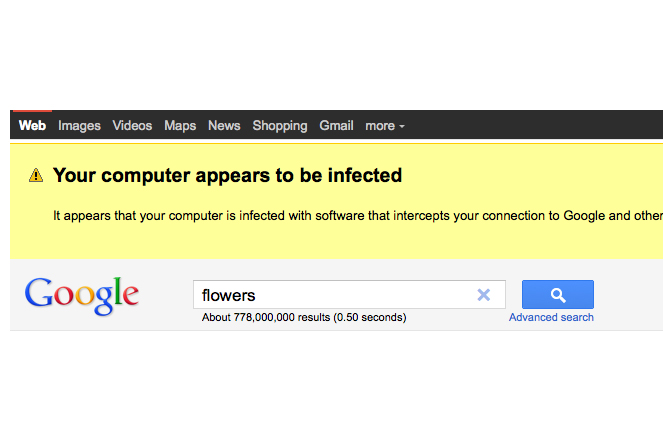Google search malware strain hits millions
Around two million computers are infected with a form of malware Google has been tracking.


Google yesterday warned "a couple of million machines" were infected with a form of malware the web giant has been tracking.

Hundreds of thousands more look set to be contacted in the coming days.
"The malware appears to have gotten onto users' computers from one of roughly a hundred variants of fake anti-virus, or 'fake AV' software that has been in circulation for a while," said Google security engineer Damian Menscher, in a blog post.
"We aren't aware of a common name for the malware."
Google said it discovered the infections after detecting "unusual search traffic" whilst carrying out maintenance on one of its data centres.
"This particular malware causes infected computers to send traffic to Google through a small number of intermediary servers called proxies," Menscher said.
"We hope that by taking steps to notify users whose traffic is coming through these proxies, we can help them update their anti-virus software and remove the infections."
Get the ITPro daily newsletter
Sign up today and you will receive a free copy of our Future Focus 2025 report - the leading guidance on AI, cybersecurity and other IT challenges as per 700+ senior executives
Google also sought to allay fears cyber criminals would copy the warning banner in order to dupe web users into clicking through and sending them to a malicious website.
"We thought about this, too, which is why the notice appears only at the top of our search results page," Menscher added.
"Falsifying the message on this page would require prior compromise of that computer, so the notice is not a risk to additional users."
Tom Brewster is currently an associate editor at Forbes and an award-winning journalist who covers cyber security, surveillance, and privacy. Starting his career at ITPro as a staff writer and working up to a senior staff writer role, Tom has been covering the tech industry for more than ten years and is considered one of the leading journalists in his specialism.
He is a proud alum of the University of Sheffield where he secured an undergraduate degree in English Literature before undertaking a certification from General Assembly in web development.
-
 Should AI PCs be part of your next hardware refresh?
Should AI PCs be part of your next hardware refresh?AI PCs are fast becoming a business staple and a surefire way to future-proof your business
By Bobby Hellard Published
-
 Westcon-Comstor and Vectra AI launch brace of new channel initiatives
Westcon-Comstor and Vectra AI launch brace of new channel initiativesNews Westcon-Comstor and Vectra AI have announced the launch of two new channel growth initiatives focused on the managed security service provider (MSSP) space and AWS Marketplace.
By Daniel Todd Published